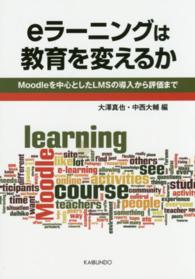- ホーム
- > 洋書
- > 英文書
- > Computer / General
Full Description
Whereas a number of years ago the focus was largely on applying artificial intelligence to designing as an activity, thus treating designing as a form ofproblem solving, today we are seeing a much wider variety ofconceptions of the role of artificial intelligence in helping to model and comprehend designing as a process.
-

- 電子書籍
- 君のために弾くショパン 15
-

- 電子書籍
- こころのめ 子どもの詩心を育む本





